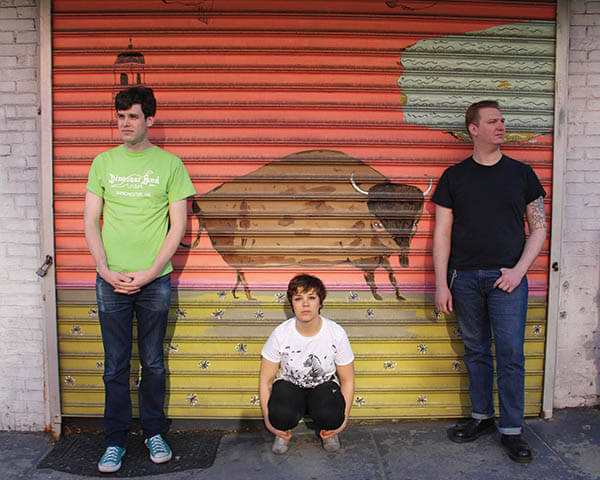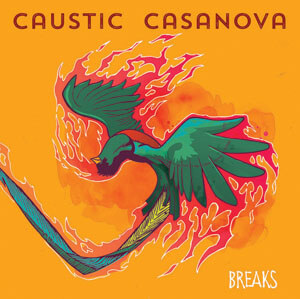CAUSTIC CASANOVA
On The Importance of Knowing When to Use a Producer vs. Self-Producing an Album
Caustic Casanova has a brand-new album out entitled Breaks, and we’re absolutely in love with it. Join us as we chat with the badass, post-punk, noisy Guatemalan-American band about their recording process, their indie business strategies and modern production techniques…
Since 2006, Caustic Casanova has released four albums. Has the band’s recording process changed since you recorded your first EP Dichotomies?
Stefanie: We space out the recording more now. We used to concentrate the entire recording process into one gigantic session or two long weekends, however we’ve found spacing out the sessions gives the songs more time to breathe so we can internalize them and self-edit. Another thing we started doing is recording demos of unfinished songs in the first session. That helps a great deal with developing the vocals and gives us more time to step back and think about how the parts of the song are coming together.
Francis: As far as I’m concerned, we were children when we recorded Dichotomies. We wrote some songs, practiced them for a month and cut the record in a day. We had no idea what we were doing.
It was only for Someday You Will Be Proven Correct that we realized the best way to write and prepare in Caustic Casanova and that is with endless repetition. All three of us lived in Washington, DC together for over a year, played many shows, did a little touring here and there, and practiced frequently. The songs became really good from an arrangement and technical skill perspective only because we relentlessly rehearsed them, often to the point of boredom. But when you do that, new ideas, perspectives and layers start to emerge from the songs. When Michael left and Andrew joined the band, we continued to work that way.
Songs are usually in the pipeline for a long time before they’re recorded and we usually mess with arrangements during the recording process. That’s how we wrote Breaks, a decent amount of the material was written as bass and drum jams before Andrew was even in the band. Stefanie and I wrote a bunch of material simply out of boredom because we were living in DC and our old guitar player was in Boston. During most of 2012, we rarely practiced as a three piece. When Andrew joined, he brought his guitar parts and ideas to pre-existing song structures. The rest of the songs were written collaboratively.
Let’s talk about your new album Breaks. You enlisted James “J” Robbins (Jawbox and Burning Airlines) to produce the record. How did you meet him and what made you all decide to use him as your producer?
Francis: J is one of the best record producers around; all the records he makes sound great and he gets the best drum sounds out of his room and the drummers we works with. I was sick of having crappy sounding recordings, and I loved the drum sounds he got producing one of my favorite records of all time, Clutch’s Robot Hive/Exodus. I contacted his manager about doing a record with him in 2011, and it took a while but we finally negotiated a session for Someday You Will Be Proven Correct. Since then, we’ve done two 7 inch singles with him and our new full length Breaks. He’s become a friend and mentor and we will work with him in the future. He’s helped us so much – his influence on the band and importance to us is hard to overstate at this point.

Why enlist a producer for this particular album instead of producing it yourselves?
Stefanie: J is fantastic to work with. Our first experience working with him was so positive that we keep coming back! At this point I think he understands the kind of band we are and what we’re trying to do, so that adds to the comfortable and creative dynamic as well.
Francis: J doesn’t want to be credited as a producer, unless the bands want to credit him. He prefers to say he “recorded” an album. We list him as a producer because when he offers advice in the studio, more often than not we take it. J has lots of little ideas here and there for guitar pedal set ups, vocal approaches, just about anything you can think of. He tries to enhance our vision with his knowledge of songcraft and his expertise about the recording process. He’s endlessly patient with me when I have a list of things I want to “try” on every track from an arrangement perspective. We work really well together because we’ve spent so much time together.
Do you recall what gear was used on the majority of the tracks?
Stefanie: We recorded at Magpie Cage in Baltimore, which is J’s studio. I play with Pearl Export EX series shells, DW 9000 kick pedal and hi-hat stands, a Pork Pie Big Black brass snare drum, and a combo of Paiste, Zildjian A’s, and Zildjian Z3 rock cymbals, including my favorite, the mega bell ride.
Andrew: I basically just used my live setup. I plug my Gibson SG into all my pedals, and I split the signal between my Carvin half-stack and Marshall JCM 800. I really just want to recreate the album sounds when we play live.
Francis: I used my Orange amp and cab, also an Ampeg cab – it’s the exact same as my live setup.
How is playing with Andrew different than Michael Wollitz (former guitar player)?
Stefanie: Andrew has brought both a heavier and more psychedelic sound to Caustic Casanova. His tone is more sinister sounding than Michael’s, and I mean that in a good way (laughs). He comes to the band with heavier ideas than Michael did and that’s obviously a byproduct of his influences as a guitar player. He also brought more of a punk sound to the band. He’s very willing to experiment with different tones, pedals, and even an EBow – so that’s added to our ever-evolving sound.
Caustic Casanova is now based out of the DC area. DC has a rich punk lineage; did you all get involved in the DC punk scene prior to starting Caustic Casanova?
Stefanie: I was aware of Dischord Records and some of the bands from the DC scene in college and I was actually a big fan of Q and Not U during high school, but it wasn’t until I moved to the DC area for the first time that I began to embrace the scene and learn more about it. I’ve definitely become more of a fan of bands like Fugazi, Rites Of Spring, and Jawbox. It’s especially cool listening to newer bands now, knowing that they were clearly influenced by Dischord and others who were cultivating the scene back then.
Since we’re on the subject of DC punk rock, the scene has long espoused the do-it-yourself mentality; producing one’s own records and pressing them up DIY at a discounted cost to sell directly to fans and consumers. Would you consider Caustic Casanova to be a DIY act? If so, in what ways do you embody the DIY punk ideology?
Stefanie: Yes, we definitely identify with and embody many aspects of the DIY ethos. We plan our own tours, book and promote our own shows, design flyers and handbills for local shows. Until we got signed to Retro Futurist last year, we paid for all of our recordings ourselves. We still fund most band endeavors from our pockets and are always looking for ways to help out the local scene and make people in DC aware of the great musical talent that still exists in town.
Andrew: Anytime we have a show in DC, for at least one or two weeks I am out in the streets, at other shows, at record stores handing out flyers to people and putting up posters to get as many people as possible to come to our shows. I do everything I can to meet musicians and members of the local music community. I try to be as active as a participant, and as good and supportive of a friend and fan I can be of other musicians and bands in the city. Fortunately, DC is the kind of city where I can see local bands perform almost every night of the week.
How has the band’s marketing and business structure changed since you released your first record?
Stefanie: Now we are more aware of the importance of self promotion. It’s not only important, it’s absolutely vital to have a marketing plan and promote your band in different ways if you want to succeed. We use multiple social media outlets to promote shows, new releases, and help cultivate our image as a band. We update most all of them almost every day. We use Instagram and Vine for silly band videos and other funny content to showcase our personalities to fans so they can connect with us in that way.
On the business side of things, we are a lot more vigilant and disciplined with keeping track of merchandise and inventory. Plus we keep meticulous track of our profits and expenses while on tour. We’ve been touring a fair amount since 2012 so we have a pretty good idea of what works and what doesn’t in regards to social media; we figured out what sells and what doesn’t in regards to merchandise. We have learned so much doing it all ourselves!
Do you feel the struggles and obstacles that indie/DIY bands face in 2015 are any different than the problems facing the punk bands of the late-’70s and early-’80s?
Francis: Yes, it’s very different. It’s hard to compare the current situation to the punk scene in the ’70s and ’80s because the punk label covers an extremely broad category. It’s everything from bands on major labels to local bands printing their own shirts and doing handmade 7-inches. In 2015, access to quality recording is everywhere. Anyone can produce a record, so having a recording out or even a fancy double LP vinyl record isn’t going to sell someone. Market saturation has definitely changed the way people perceive music; there’s so much music accessible on any device to any person. Getting started is easier than ever, getting people to care about your band is harder than ever. Selling physical copies in the age of Spotify is as hard a sell as ever. But we’ll adapt to the times, there is no other option.
Follow on Twitter @CausticCasanova

Caustic Casanova
Breaks
Standout Track: “Show Some Shame”
BUY NOW at iTunes
